

Modern Mechanix. Must have been a slow news week.
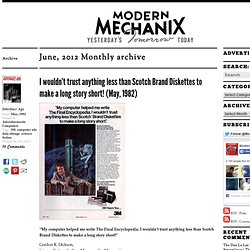
They manage to take half the article to string out the idea that she *might* be a lesbian. Googling her name I found that I had posted another article featuring her and other teacher/call girls from around the same time. She later went on to write an apparently salacious yet frank book about her days as call girl. What I found most interesting (at least in the post I read) was the idea that a woman’s prison was the only place a woman could safely be openly gay. According to the blurb, she was not, in fact a virgin when she got into the business. Also a somewhat disturbing quote about her father that intimated a possibly abusive father and/or the public’s fascination with the Freud: “My father was a shadowy figure in my life, scarcely distinguishable from any other big man with a hat and cigar”.
-book blurb via the excellent (though slightly NSFW) blog Pulp International. Turns out that there were two drawbacks to using wire. Expressionist music. Alexander Scriabin. Alexander Nikolayevich Scriabin Alexander Nikolayevich Scriabin[1] (English pronunciation: /skriˈɑːbɪn/;[2] Russian: Алекса́ндр Никола́евич Скря́бин, Russian pronunciation: [ɐlʲɪˈksandr nʲɪkəˈlaɪvʲɪtɕ ˈskrʲæbʲɪn][citation needed]; 6 January 1872 [O.S. 25 December 1871] – 27 April [O.S. 14 April] 1915)[3] was a Russian composer and pianist.
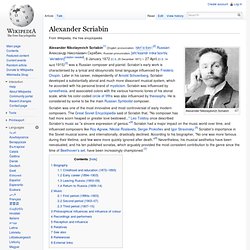
Scriabin's early work is characterised by a lyrical and idiosyncratic tonal language influenced by Frédéric Chopin. Later in his career, independently of Arnold Schoenberg, Scriabin developed a substantially atonal and much more dissonant musical system, which he accorded with his personal brand of mysticism. Scriabin was influenced by synesthesia, and associated colors with the various harmonic tones of his atonal scale, while his color-coded circle of fifths was also influenced by theosophy. He is considered by some to be the main Russian Symbolist composer. Biography[edit] Childhood and education (1872–1893)[edit] Zverev's students in the late 1880s. Ravel, Maurice in Oxford Music Online. Maurice Ravel. Ravel in 1925 According to SACEM, Ravel's estate had earned more royalties than that of any other French composer.
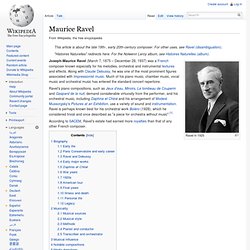
Biography[edit] Early life[edit] Birthplace of Maurice Ravel in Ciboure Ravel was born in the Basque town of Ciboure, France, near Biarritz, only 18 kilometers from the Spanish border, in 1875. Ravel was very fond of his mother, and her Basque-Spanish heritage was a strong influence on his life and music. Paris Conservatoire and early career[edit] Piano class of Charles de Bériot in 1895 with Ravel on the left Ravel’s parents encouraged his musical pursuits and sent him to the Conservatoire de Paris, first as a preparatory student and eventually as a piano major. Ravel was not a "bohemian" and evidenced little of the typical trauma of adolescence.
Ravel and Debussy[edit] The two musicians also appreciated much the same musical heritage and operated in the same artistic milieu, but they differed in terms of personality and their approach to music. Symbolism (arts) Distinct from, but related to, the style of literature, symbolism of art is related to the gothic component of Romanticism.
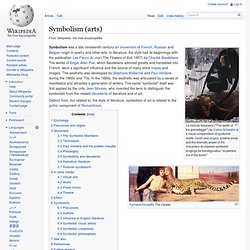
The term "symbolism" is derived from the word "symbol" which derives from the Latin symbolum, a symbol of faith, and symbolus, a sign of recognition, in turn from classical Greek συμβόλον symbolon, an object cut in half constituting a sign of recognition when the carriers were able to reassemble the two halves. In ancient Greece, the symbolon, was a shard of pottery which was inscribed and then broken into two pieces which were given to the ambassadors from two allied city states as a record of the alliance. The symbolist poets have a more complex relationship with Parnassianism, a French literary style that immediately preceded it. While being influenced by hermeticism, allowing freer versification, and rejecting Parnassian clarity and objectivity, it retained Parnassianism's love of word play and concern for the musical qualities of verse. Stéphane Mallarmé.
Biography[edit] On 10 August 1863, he married Maria Christina Gerhard.
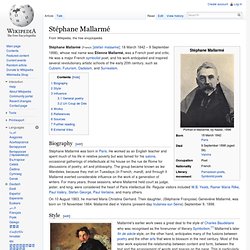
Their daughter, (Stéphanie Françoise) Geneviève Mallarmé, was born on 19 November 1864. Mallarmé died in Valvins (present-day Vulaines-sur-Seine) September 9, 1898. Style[edit] Some[who?] Influence[edit] General poetry[edit] Stéphane Mallarmé as a faun, cover of the literary magazine Les hommes d'aujourd'hui, 1887. Man Ray's last film, entitled Les Mystères du Château de Dé (The Mystery of the Chateau of Dice) (1929), was greatly influenced by Mallarmé's work, prominently featuring the line "A roll of the dice will never abolish chance". Un Coup de Dés[edit] Mallarmé during his career. On the publishing of "Un Coup de Dés" and its mishaps after the death of Mallarmé, consult the notes and commentary of Bertrand Marchal for his edition of the complete works of Mallarmé, Volume 1, Bibliothèque de la Pléiade, Gallimard 1998.
Prior to 2004, "Un Coup de Dés" was never published in the typography and format conceived by Mallarmé.